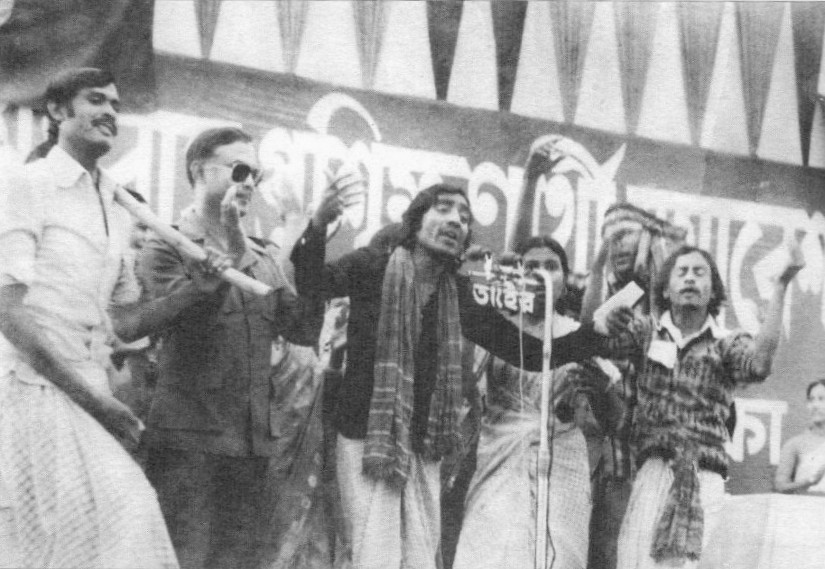
Zia enjoying cultural event at Dhaka, 1978
January 19, marks the birthday of Ziaur Rahman, the founder of the Bangladesh Nationalist Party (BNP) and an advocate for multi-party democracy in the country following the era of Bakshal. Born on January 19, 1936, in Bagbari village of Bogra district, Ziaur Rahman is remembered with deep respect for his outstanding role in the great Liberation War of Bangladesh. Subsequently, after the assassination of Bangabandhu, he once again emerged as a saviour during Bangladesh's turbulent political period.
An article titled 'Ziaur Rahman: Life and Political Thought,' written by Dr. Mohammad Kamrul Ahsan, Professor in the Department of Philosophy at Jahangirnagar University, was published by Daily Nayadiganta on January 19, 2023. This article is presented briefly for the readers of Bangla Outlook, shedding light on Ziaur Rahman's contributions as a proponent of multi-party democracy in Bangladesh and as the founder of the Bangladesh Nationalist Party (BNP).
-
Ziaur Rahman declared the independence of Bangladesh, earning him the extraordinary stature of a patriot with immense courage. He did not suddenly become a freedom fighter. A glimpse of this can be found in his essay, 'Birth of a Nation,' written in 1974. He stated, "The loyalty of Bengali officers in the Pakistan Army was unquestionable. Of course, except for a few brokers, they kept us in demand, neglected, and disrespected us. Skilled and qualified Bengali officers and soldiers did not receive any recognition or reward. They only received neglect and contempt... Bangabandhu's historic announcement at the Race Course Maidan on March 7 seemed like a green signal to us. We finalized our plan but did not tell any third party. Tensions were also rising between the Bengali and Pakistani soldiers..." (Rahman, Major General Ziaur (1974), 'Birth of a Nation,' Bichitra, Independence Day Special Issue, 26-March-1974, Dhaka).
Zia's declaration of independence to his soldiers in the early hours of March 26 was supported by his colleagues. Later, on March 27, he stepped into the spotlight by declaring independence on the radio (Mohiuddin Ahmad, BNP er Somoy Osomoy, 2017, page 46).
Ziaur Rahman is assumed by many to be the reason behind the August 15 change. After the coup d'état of August 15, 1975, Khondaker Mostaq Ahmad came to power and imposed martial law. Although the constitution was kept in force, he narrowed the scope of civil rights by introducing amendments. President Khondaker Mostaq Ahmad issued the Indemnity Ordinance on September 26, 1975, to provide legal protection to army officers involved in the August 15 coup and assassination. The order stated that no one involved in the August 15 coup could be prosecuted (Mohiuddin Ahmad, 2017, page 64).
Moreover, according to the commentary of Colonel Safayat Jamil, despite his strong opposition, Major Rashid, Farooq, and Dalim, who were involved in the Khondakar Mushtaq coup and murder, were promoted from Lieutenant to Colonel (Safayat Jamil, 2009, page 7). This incident disproves the accusation that Ziaur Rahman issued the indemnity ordinance to provide legal protection to those involved in the August 15 coup.
Zia's assumption of office changed the ruler and transformed the state of Bangladesh. A concrete and practical outline of the philosophical underpinnings that would shape the nation emerged. The Bangladesh Nationalist Party (BNP), founded on the intellectual basis of Bangladeshi nationalism, has gradually evolved into a gathering point for individuals inspired by patriotism, irrespective of religion, caste, or creed.
There are many reasons behind this group's acceptance and popularity. Three significant reasons are: 1. The philosophical basis of nationalist parties; 2. Ziaur Rahman's brilliant image; and 3. Effective organizational action and implementation of developmental social and economic programs.
Ziaur Rahman's philosophy of Bangladeshi nationalism has been widely discussed in intellectual circles nationwide. Explaining the significance of this state philosophy, Professor Ahmed Sharif said, "In state nationalism, marginalized tribals, regardless of caste, language, and culture, all receive recognition of equal status and equal rights; they are not held hostage" (Diary of Ahmad Sharif, Bhav-Bubdud, page 64).
In the article 'Bangladeshi Nationalism,' Ziaur Rahman clearly states that Bangladeshi nationalism is neither religious nor secular. This form of nationalism, instead, affirms everyone's religious beliefs and rights. Zia did not constitutionally declare the country as an Islamic Republic; instead, he demonstrated political foresight by adding 'Bismillah' to the constitution. Through the introduction of Bangladeshi nationalism, he aimed to uphold the national identity of non-Muslim citizens on the one hand. On the other hand, he added 'Bismillah' to the constitution as a symbol of sincere support for the exercise of cognitive rights and freedom by the majority of Muslims. The distinguished scholar Ahmed Sofa stated, "Politics without connection with the potential and tradition of Islam has no future in this country" (Ahmed Sofa, Bangali Musolmaner Mon, 1981).
One of the reasons behind the popularity of the nationalist party is Ziaur Rahman's stature. The creation of this image is rooted in the practice of exceptional integrity and virtues in his personal life, with numerous examples supporting this claim.
Another reason behind the acceptance of this group is practical organizational measures and the adoption of developmental social and economic programs. The essence of Zia's nationalist philosophy is that achieving the desired goal of independence is not possible through a mere change of power. To accomplish this, a correct understanding of the ideology of the nationalist party, based on the philosophy of Bangladeshi nationalism, and its implementation is required. Undoubtedly, Zia's brilliant image will play a role in achieving this goal.
